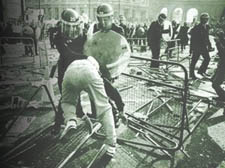|
|
 |
| |

Police and protesters clash during the 1990 Poll Tax riots |
London burning: a radical hotbed’s history
From Lenin to Michael X, a series of talks, tours and screenings are set to celebrate a revolutionary spirit difficult to imagine in today’s conservative
capital, writes Simon Wroe
REVOLUTION has always lurked behind Islington’s coffee cups.
From riots at Mount Pleasant in the 1830s to illicit political meetings in Jerusalem Passage and terrorist attacks, radicalism is so much a part of the area that neither Lenin’s residency nor a National Front pub could raise an eyebrow.
If you want a yardstick for the temperament of the area, look at Lenin’s landlady. While the polemic newspapers rolled out of 37 Percy Circus, King’s Cross, she was only concerned that the Russian exile’s wife – who would not wear a wedding ring – might lower the moral standards of the neighbourhood.
Comfortably situated in this historic nest of dissidents and firebrands is Housmans Bookshop. Established by pacifists in the aftermath of the Second World War, the Caledonian Road premises claims to be the “only dedicated non-partisan radical bookshop in London”.
It remains a hive of political activism and, as if it needed to prove the point, it will host a series of talks, film screenings and walks over the next two months celebrating the city’s radical roots.
London’s Burning sheds light on visionaries such as William Blake (brought into the present day by the philosopher Peter Marshall) and the less celestial, namely Holloway’s black power activist and gangster Michael de Freitas, aka Michael X.
Stories of violence, East End mythology and Notting Hill’s counter-culture all feature; plus a rare screening of John Rodger’s documentary on psychogeography, The London Perambulator.
Historian David Rosenburg, of Tufnell Park, leads two walks through historic quarters of London, starting on Housmans’ doorstep.
The tour passes the spot where the Spenceans plotted to take over the Bank of England and the Tower of London – they clashed with police in what is now a children’s playground – and goes by The Agricultural on Chapel Market, a National Front stronghold until the 1980s. It doffs a cap to the former headquarters of the anti-apartheid movement in Penton Street, which was bombed by a South African operative in 1982, and Mount Pleasant, where three officers from the nascent Metropolitan Police were stabbed during a “kettled” demonstration of the National Union of the Working Class.
“These things tell you about a time of political activism which is hard to imagine in quite the same way today,” explains Rosenburg. “There used to be 300,000 people living there, now 180,000.
“When Lenin came to live in Islington one of the things he remarked about London in general was that it was two nations, the rich and the poor. In a way Islington is still two nations – it still has the highest numbers of social housing and massive pockets of gentrification – though it is not always obvious to the people on the outside.”
If “kettling” and riots over the economy sound familiar, there are many other modern parallels. Rosenburg cites the example of Risinghill School, on the site of Elizabeth Garett Anderson. Its progressive policies and advocacy of “pupil democracy” was light years ahead of its time when it was founded in 1959; so far before its time, unfortunately, that it was closed down by worried school inspectors in 1965.
Under the auspices of its headteacher, Michael Duane, Risinghill was a multiracial school before they were commonly thought to exist in England. When he refused to expel children or use corporal punishment, the government forced the school to close its doors; now it is the template for secondary schools across not only the borough but the country as well.
“There were moments when there was massive support for political alternatives,” says Rosenburg. “Obviously it’s hard to see that happening right at this moment, although one would hope that would develop again.”
|

|
 |
| |
|
 |
|

